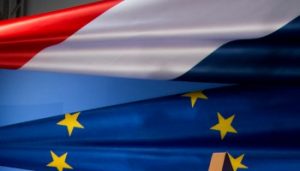A Dutch house of cards
Economy 13 March 2017851 000. It is the unique number of news brought by Google to you if your search action on Wednesday 8th of March, was “Dutch elections 2017”. For instance this number was quite same only several days before the US presidential elections was held last year. It seems that even Google understands the significance of the Dutch plebiscite; or maybe media are those who draw a significant attention to the event; maybe we, as a public are those who to be blamed; at the end, what if those elections mean the real end of the house of cards called the European Union?
A series of elections and referendums in the most important EU member states, France, Germany and the Netherlands are to be held in 2017. The nearest one is the elections scheduled to be held on Wednesday 15th, and the right to cast their vote will have over 10 million of voters. The Dutch are supposed to choose between the far right political parties, such as Party for Freedom (PVV), led by eurosceptic Geert Wilders, and Party for Freedom and Democracy (VVD), which constitutes its existence based on the liberal economy premises. What are the key economic platforms of those parties and will they influence the effectuation of the “multispeed EU” project, announced by the four EU leaders (Germany, France, Italy and Spain)?
The opinion polls show the trend of decline of number of votes for the radical PVV. By the end of December 2016, they would have won 36 seats in the Dutch Parliament, and on the 7th of March, the latest surveys show that PVV is likely to gain 23 mandates. On the opposite side, the VVD is about to win the 26 seats, and the CDA about 20, while other parties will have significantly less number of MPs within the Parliament.
“Nederland de-islamiseren” is the ultimate slogan of the PVV, and seems the only what this party can offer to the Dutch public. No Islamic inhabitants in the Netherlands and no economic platforms for the increase of the very bad ratio of the Dutch economy in the last several years.
To make the things worse – he announced the set of opt outs from the common policies of the EU, which potentially could lead to the Dutch exit from the Union.
After the world economic crisis occurred in 2008, the Dutch export has dramatically fallen in 2009, while its recovery started to be real in the next five years. In 2016, both import and export have significantly fallen down from 560 billion USD down to 460 billion USD. In accordance with the World Bank data, the 75% of total Dutch services and goods are exported to the four EU member states: Belgium, France, Germany and the UK. The same Union from which Wilders wants to step out from. He announced that the Netherlands would organize a referendum over the Dutch exit from the European Union.
Most of the economic forecasts for the Netherlands indicate that the macroeconomic indicators will be significantly worse in case of leaving the Union. The DW has made an economic overview over the current economic conditions within the Netherlands. A detailed analysis could be seen here. According to the analysis, the biggest change will be in the unemployment rate within the Kindgom.
What is notable is the fact that the even within the economy section texts at the Newsletter for the EU, is the most common used key word: crisis. The EU lives its hypocrisy for more than a decade. Beside the well known economic crisis which shaken the world, the significant number of analysts provide evidences concerning the even political crisis within the EU. Several options are offered such as dividing the Union into the several blocs or the multispeed EU project.
The Dutch economy is not performing well. Its situation reminds the European public, as the house of cards ready to disappear. Even the slight moment such as the far right party victory at the elections, could possibly break the house of cards, and eventually the European dream.

http://i2.wp.com/blogs.lse.ac.uk


